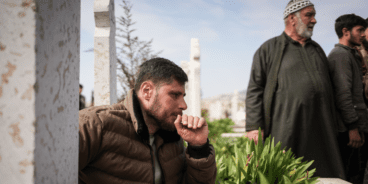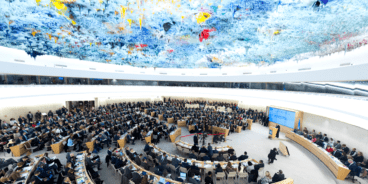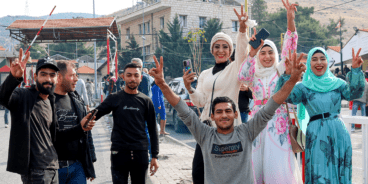Syria: 7 years, 11 vetoes, 500,000 dead
This Thursday, 15 March, will mark seven years of deadly conflict in Syria. Since 2011 half a million people have been killed, over 11.7 million have been displaced from their homes and 13.1 million people remain in dire need of humanitarian assistance. As the war enters its eighth year, the prospects for peace remain dim.
Throughout the course of Syria’s civil war every major principle of international law has been violated. Numerous parties to the conflict have conducted indiscriminate attacks on civilians, perpetrated sexual violence, deliberately blocked humanitarian aid, and used food as a weapon to starve besieged communities. However, the Syrian government has far greater military capacity to inflict suffering on civilians and bears a greater burden of responsibility for war crimes and crimes against humanity. For seven years the Syrian government has systematically waged war against its own people and has manifestly failed to uphold its responsibility to protect.
The UN Security Council has also failed the Syrian people. Because of Russian opposition, in late 2017 the Council was unable to extend the mandate of the Organization for the Prohibition of Chemical Weapons Joint Investigative Mechanism, which was established to identify perpetrators of chemical weapons attacks in Syria. The prohibition of chemical weapons is one of the oldest norms of the international community, dating back to 1899 and the Geneva Protocol of 1925. The Council’s failure to unite even on this issue has helped to gradually normalize chemical warfare. There have been at least seven reported chemical weapons attacks in Syria so far this year.
The eleven vetoes by Russia and six vetoes by China over the past seven years of Syria’s civil war clearly demonstrate the need for all Security Council members to adhere to the ACT Code of Conduct in mass atrocity situations, which has been signed by 113 member states and 2 observers. Deep and comprehensive Security Council reform is needed to enable it to consistently and comprehensively uphold its responsibility to protect.
Even when the Security Council can reach diplomatic consensus on Syria they have been utterly ineffective in enforcing their decisions. Despite the 24 February adoption of Resolution 2401 demanding a 30-day cessation of hostilities, the Syrian government and its allies – including Russia – continue to conduct airstrikes on civilian areas across the country. Since the escalation of a military offensive on opposition-held eastern Ghouta on 18 February, over 1,100 civilians have been killed in the besieged enclave.
While the Syrian government and its allies continue their systematic bombing and destruction of eastern Ghouta and other opposition-held areas, it is premature for the international community to discuss reconstruction plans. Agreements regarding the rebuilding of Syria’s devastated cities and towns should only take place in the context of a wider agreement around the country’s political future and accountability for mass atrocities.
In this context, all UN member states should support the International, Impartial and Independent Mechanism (IIIM) for Syria established by the UN General Assembly in 2016 to investigate atrocities and provide an alternative route to accountability. All UN member states should facilitate the work of the IIIM through the provision of voluntary funding and technical assistance.
International justice can eventually catch up with any perpetrator of mass atrocities, regardless of how powerful they currently appear. While the IIIM cannot end the suffering of Syrian civilians, it can help ensure that those responsible for war crimes will face justice one day. On this tragic anniversary, the international community should recommit to ending this terrible civil war and winning the battle against impunity in Syria.
Read Next

Atrocity Alert No. 430: Syria, Central African Republic and the Philippines

Letter to UN Human Rights Council members on atrocity prevention priorities at the Council’s 58th session
